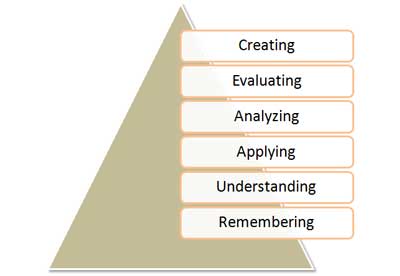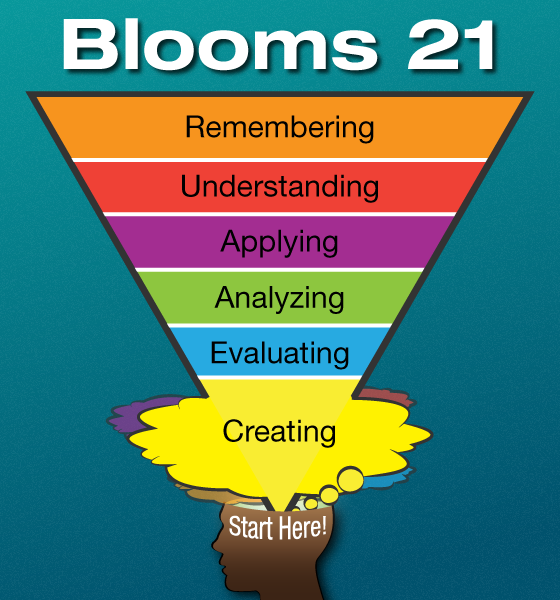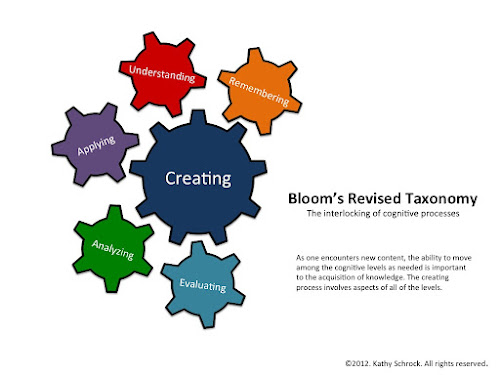The Curious Case of the Flipped-Bloom's Meme
(This is the sequel to 'Anatomy of a (Flipped) Meme')
rss / email subscribe / follow Steve
Last post I dug up the history of the Flipped Classroom idea. In this thrilling conclusion I look a variant: the "Flipped Bloom's Taxonomy" meme, which isn't even a meme yet, although in the last three weeks it has looked to get enough traction via one very influential blog post.
Do a google image search for Bloom's and see what shapes you get:
The very first image has been FLIPPED upside down! This image has been around for years, but it's only the last few days that Twitter has lit up with the NEW Flipped-Bloom's MEME!!
Never Meant to Be One Way
Of course, Bloom's taxonomy was never meant to be linear or sequential.
The version I always knew was a pyramid:

But as with the general flipped learning meme, if you look you can find plenty of examples dating back years.
This looks like a flipped pyramid right here, dating from 2001:
And the taxonomy was revised in 2000 by Loren Anderson, who also appears to have turned it upside down, although I can't get a really good reference for this. This is the upside down graphic that comes up first when I run a google images search for Bloom's:
Much criticism has been levelled at Bloom's, but although "a more radical approach would be to have no taxonomy at all" (2003), human beings LOVE a taxonomy, especially one with a one-syllable name and a nice stable pyramid under it!
Don't get rid of Bloom's, just swivel it 180 degrees!
May 5 - A Conversation with Aaron Sams
Aaron Sams mentioned the Flipped Bloom's idea to us when we met him a few weeks ago: "The other thing is just trying to find different models in the way this whole flipped approach works because it’s not just one way to put them."
"So, the idea is how do you approach Bloom’s? Do you go from the bottom up, or do you approach Bloom from the top-down? If we can minimize the remembering and understanding stuff, you start with the project, so project-based learning starts top and they tap down as needed versus starting at the bottom with content and climbing your way to the top and, hopefully, you get to a culminating it in to your project."
May 15 - Enter Shelley Wright
So, dear reader, imagine my surprise shortly after returning from my pilgrimage to my leafy Australian home, to come across this post: http://plpnetwork.com/2012/05/15/flipping-blooms-taxonomy/
Except that, I didn’t read it there, I read it on the Mindshift blog where it was republished: http://blogs.kqed.org/mindshift/2012/05/flip-this-blooms-taxonomy-should-start-with-creating/
Her original post was on May 15, and the Mindshift clone was May 17.
Which of the two sites has a larger readership, I do not know, but the little bunny-meme went virile. An excerpt search shows the blog being linked to in 454 other sites as of today, May 26.
This is a fractal jump in scale, but it doesn’t count as full-blown viral, yet. It could be a flash in the pan, a blip on the radar.
I've been counting the tweets mentioning 'Flipping Bloom's' each day since then:
16 May - 10
17 May - 2
18 May - 80 (Mindshift blog is a super-node?)
19 May - 70 (Mindshift blog is a super-node?)
20 May - 30
21 May - 30
22 May - 22
23 May - 21
24 May - 29
25 May - 6
26 May - 19
You can just feel this new virus striving for life, pushing, pushing to jump up another order of magnitude or two into fractal viability.
So had Shelley Wright Spoken to Aaron Sams?
I logically concluded Shelley Wright must have heard the idea from Aaron Sams. So I asked Shelley, but she's never heard of Aaron!
Detective hat on, I bounced back to Aaron and asked where he heard the idea from. He couldn't recall hearing "Flipped Bloom's" from anyone else, but said he'd been using it for about 6 months in his presentations.
He did, however, point me to Lorin Anderson's "inverted pyramid" which I've mentioned above.
Further searching by yielded another interesting find:
Back in 2009, we have "Inverting Bloom's Taxonomy".
"INVERTING!?" PEOPLE! How many times must I tell you! Don't say 'invert', say 'flip'! The punters want 'flip', they don't want 'inverting'.
This 2009 version got little traction.
Let this be a lesson to everyone: if you turn something upside down, and want people to pass around the idea, choose your keyword carefully.
Inevitable Ideas
"There is nothing as powerful as an idea whose time has come."
Victor Hugo
It's all context.
Bloom's taxonomy pyramids floating everywhere, sunny-side up.
Then an inverted graphic from 2001.
"Inverting Bloom's" in 2009.
Still all quiet on the western front.
Then the "FLIP" engine, lurking in wings, catches the wind in 2010.
How long could it be until someone connected the FLIP-engine to Bloom's pyramid? How long until someone thought "that ain't just inverted, that's flipped!"
Was this inevitable? Aaron Sams and Shelley Wright seem to have been saying it concurrently, unaware of each other.
And will Shelley Wright's post with its beautiful graphic be enough to tip the equation up to the next level?
I really hope so. I like Bloom's the other way around.
Project-Based Learning in a Soothing Package
Flipped Bloom's is remarkably close to Project-Based Learning. But you try saying "Project-Based Learning" or even "PBL" a few times! Sounds a leetle beet hard! A leetle beet threatening!
It tells me I've been basing my learning model on the wrong thing. "Try project-based learning" implies "You have been basing your understanding of learning on the WRONG FOUNDATION." Aggressive!
Not a bad meme, PBL, for the revolutionaries. We might need to repackage the idea for the punters.
"Flipping Bloom's" is more diplomatic, and seductive.
"Don't worry, we're just taking something you aleady know and love, and we're putting a fresh angle on it!"
"Hey, anyone can turn something upside down! Just turn it upside down!"
I hope that the Flipped Bloom's meme travels up the fractal scale dimension. I hope it continues to get traction.
Variant Graphics
Some crazy radicals, even since Shelley Wright's post, have been doing OTHER things to Bloom's that cannot be summed up in one cute syllable.
I give you Kathy Schrock's interlocking cognitive processes. She uses cogs:
And Edna Sackson dares suggest learning is not linear, and uses steps and ladders, and little people who appear to be dressed in Bloom's triangles (coincidence I think)!
(Edna has said since that this dates from 2010 - http://whatedsaid.wordpress.com/2010/05/18/constructing-meaning/. In that post she quotes Jay McTighe as advocating 'turning Bloom's taxonony on its head'. HA HA!! SO CLOSE TO 'FLIP'!! Imagine that: "so, Jay, you're saying we should... so to speak... 'flip' the taxonomy?" But in 2010 Pink and Khan had not pushed the term to its current giddy heights.)
But can anything compete with the flipped romance? As Edna Sackson says, 'Flipping is the new black.'
A Flipped Romance
'Flip' is like the puppy dog version of 'change'.
Change growls, flip purrs.
Change threatens, flip seduces.
Flip implies something can be freshened, not made reduntant. It can be redeemed, invigorated, reborn, without a change in substance or identity. When you flip something, you don't rip out its heart, you look at it from a reverse angle.
'Flip' comes without a surgeon's knife. It knocks at the door like a showman, and offers to teach you a magic trick. Just put this here and that there, and tadaaaa!
No damage done.
So all the debating, blogging, playing with the language, is really giving people a paradigm that sits between death by stagnation and death by assault. From experience, stuck between that rock and that hard place is actually where I normally do grow, but if 'flip' can get in there first and tempt me out with some bread crumbs and the promise of a better world, I shan't complain.
Australian readers may recognise the advertising equivalent, 'Don't stop it, just swap it', and recognise the limits of this method!
If Flipping Meets Occupy
I predict this won't be the last thing we see flipped.
In one conceivable future, the occupy meme will meet the flipped meme. If that happens, all bets are off!
rss / email subscribe / follow Steve












